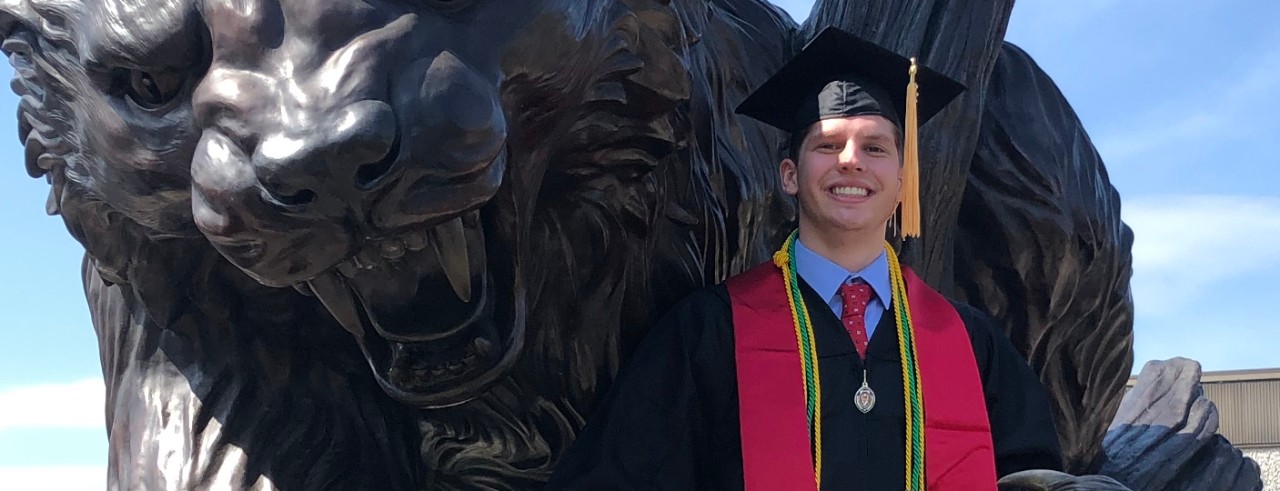
Two hospital stints give rise to passion for UC nursing grad
David Moskowitz will continue working with the Cincinnati Children's nurses who cared for him
By: Katie Coburn
Some people choose to pursue a nursing career because they have a family member who is a nurse, or they are attracted to the fast-paced environment and daily challenges of an emergency department, or they are driven by the desire to make a difference in other people's lives. For David Moskowitz, his passion for the nursing field stems from two personal experiences — one of them rather traumatic.
The accident that sparked his curiosity
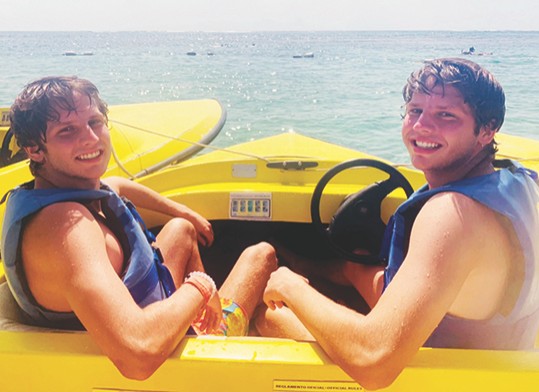
David Moskowitz (right) with his twin brother, Jack
Before his 14th birthday, Moskowitz had never been to a hospital for an injury-related incident. He and his twin brother, Jack, were celebrating their big day with a few friends at an alpine skiing resort about 30 miles northeast of Cincinnati. To prepare, Moskowitz and his brother spent ample time watching professional skiers dominate the slopes at the 2014 Winter Olympics on TV, but Moskowitz spent hardly any time on skis himself before deciding to take on one of the steepest slopes at the resort. About a minute into his descent, he realized his mistake. He fell and fractured the tibia in his right leg. His mom then drove him to Cincinnati Children's, where he would spend the next few nights recovering while his care team tried to control his excruciating pain. Luckily, Moskowitz did not need surgery.
"I'm not proud of this, but I'm a pretty stubborn hospital patient. It takes the right nurse to care for me," admits Moskowitz, whose parents recall him making a nurse cry during his first night at Children's. On his second day, Moskowitz received a new nurse named Cameron, who showed just the right mix of compassion and sternness to connect with Moskowitz and help him make the best of his hospital stay. "I left the hospital with a whole different view on the health care field and what I thought of the nursing profession," Moskowitz says.
The positive impression Cameron left on Moskowitz stayed with him through his junior year of high school, when it came time to start thinking seriously about applying to college and choosing a field of study. Moskowitz’s curiosity for nursing compelled him to tour Procter Hall. Attracted to UC's direct-admit BSN program and the university’s overall welcoming atmosphere and proximity to home, Moskowitz applied and completed the interview process in early December 2017, near the end of the first semester of his senior year. Excited for the future, Moskowitz invested all his time and energy into training for his final high school lacrosse season. Then things took an unexpected turn.
The medical scare that fuels his passion
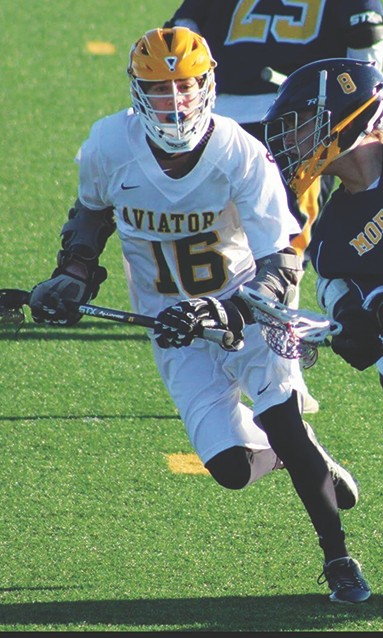
Moskowitz in a high school lacrosse game
The Sunday before finals week, Moskowitz noticed a numbness on his tongue. Thinking he had just burned it on a hot cup of coffee, he went about his day as usual, even going to lacrosse practice. Eventually, the numbness progressed to his lips and the right side of his face, affecting his speech. After coming home from practice and telling his parents, they immediately took him to the hospital. A neurology exam yielded normal results, so Moskowitz was sent home. The next morning, his fingertips started tingling. He took a final exam while his mom scheduled an MRI appointment, but he knew something did not feel right. The MRI showed Moskowitz was having a stroke caused by a brain bleed. This time, instead of riding in the back of his mom's car, an ambulance transported Moskowitz to Cincinnati Children's.
"It was like the most exhilarating experience of my life," he says. "I got to the experience the health care field during one of the most intense situations you can be in, so I was like, This is cool."
Of course, Moskowitz had no idea what would unfold. He was admitted to the pediatric intensive care unit (PICU), where they learned he had an inoperable arteriovenous malformation (AVM) in his brain caused by a genetic disorder called hereditary hemorrhagic telangiectasia. By his third day in the PICU, around Christmastime, Moskowitz had lost mobility of the right side of his body, the left side of his body was weakened and his vision was compromised. If the AVM had ruptured, he could have died. Fortunately, after three cerebral angiography procedures, his care team was able to stabilize the AVM and begin radiation.
What I remember from my patient days in the PICU are the nurses who kept me alive during the most difficult times. They remained focused and determined to do whatever they could to save my life.
David Moskowitz BSN, '22
In late January, after spending 30 days in the PICU fighting for his life and a few days in the neurology unit, Moskowitz was finally able to go home. Over the next six months, he endured grueling physical and occupational therapy and had to be tutored at home in order to graduate. Although he was too exhausted to resume his usual activity level, he attended lacrosse practices and games to cheer on his teammates and regain some sense of normalcy. In February, Moskowitz received his acceptance letter of direct admission to UC College of Nursing’s BSN program, which he says served as the motivation he needed to fully recover.
"What I remember from my patient days in the PICU are the nurses who kept me alive during the most difficult times," Moskowitz says. "They remained focused and determined to do whatever they could to save my life. They were very encouraging and hopeful that I would one day be able to pursue a career in nursing. They even told me they hoped I would be able to come work with them some day."
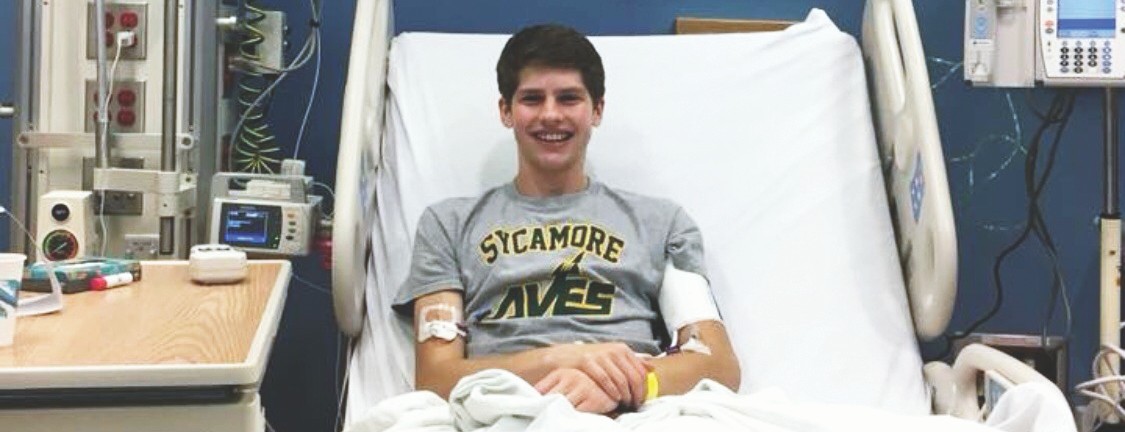
Moskowitz in a hospital bed at Cincinnati Children's. Photo/Submitted
The experiences that set him up for success
Going to college is a big life change for anyone, especially for someone who recently went through a near-death experience. To ease Moskowitz into his freshman year, his advisors spread out his courses over three semesters, including the summer. Still, it was not an easy transition for Moskowitz, who had to relearn how to study and be successful in school while also processing what happened to him. By his sophomore year, he was in a dark place mentally. Then he earned a job as a patient care assistant in the PICU at Cincinnati Children's, which served as motivation to keep pushing forward. In his final semester of his senior year, Moskowitz thrived in school and worked in the same PICU as a co-op student, alongside some of the very nurses who helped keep him alive four years ago.
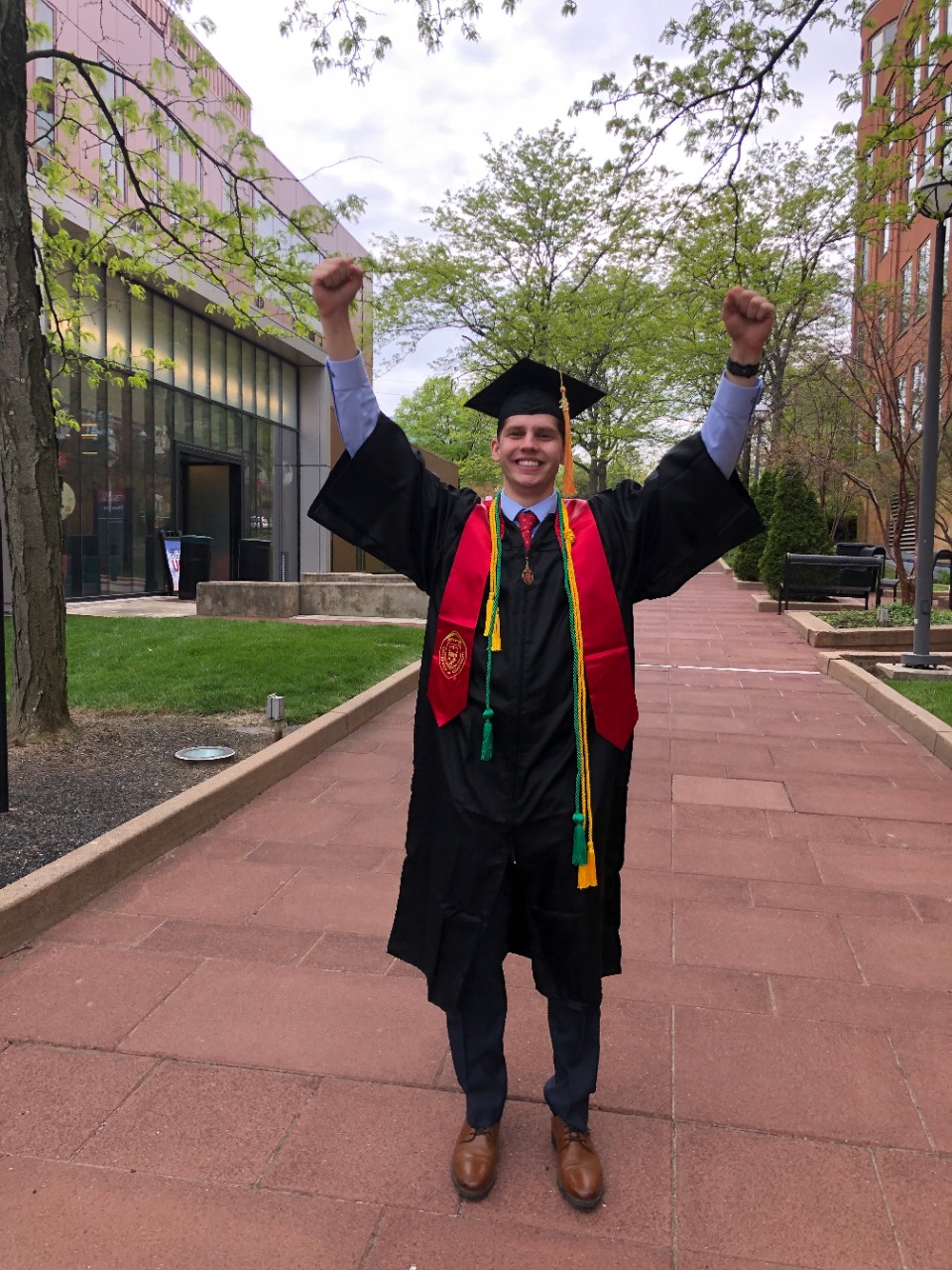
Moskowitz in front of Procter Hall, home of UC College of Nursing
Having been a patient in the PICU himself, Moskowitz says he can connect with patients on a deeper level. Now that he has graduated, he will continue working in the specialized ICU and take his NCLEX this summer.
"I can give true empathy to my patients. I know this is the place for me," Moskowitz says. "I like the challenge of the PICU and the population. I love the people I work with, and I want to be here and learn from the best."
In May 2021, three years after Moskowitz completed his radiation treatment, he returned to Cincinnati Children's for a final cerebral angiography procedure, which showed the AVM had completely cleared. On top of equipping him with an extraordinary sense of empathy, Moskowitz says his medical journey has set him up for success in a variety of ways.
"It taught me a lot of responsibility, maturity and discipline that I feel like most people don’t have going into college," he says. "I actually don't think I would have been successful in nursing school and would have dropped out if I didn't have this experience. It made me grow up a lot faster than I wanted to, but I wouldn't be where I am today without it."
In April, Moskowitz was selected the American Stroke Association’s 2022 Voters’ Choice Hero — an award given to the nominee with the highest number of public votes. In May, WCPO (Channel 9) in Cincinnati featured Moskowitz. The local news station covered his progress after his stroke in 2017.
Featured image at top: David Moskowitz, a UC Bachelor of Science in Nursing graduate, standing with the Bearcat statue on UC's main campus. Photo/Submitted
Tags
Related Stories
Ohio could soon make breast cancer screenings more affordable
May 9, 2025
The University of Cincinnati Cancer Center's Ann Brown was featured in Local 12 and Cincinnati Enquirer reports on a bill introduced by Rep. Jean Schmidt in the Ohio legislature that seeks to eliminate out of pocket medical expenses such as copays and deductibles associated with supplemental breast cancer screenings.
UC lab-on-a-chip devices take public health into home
May 8, 2025
University of Cincinnati engineers created a new device to help doctors diagnose depression and anxiety. The “lab-on-a-chip” device measures the stress hormone cortisol from a patient’s saliva. Knowing if a patient has elevated stress hormones can provide useful diagnostic information even if patients do not report feelings of anxiety, stress or depression in a standard mental health questionnaire.
Study explores social media’s growing influence on cosmeceutical...
May 7, 2025
The University of Cincinnati's Kelly Dobos spoke with Cosmetics Design USA about new research that revealed a significant rise in consumer interest in cosmeceuticals, or cosmetic products with active ingredients purported to have medical benefits.